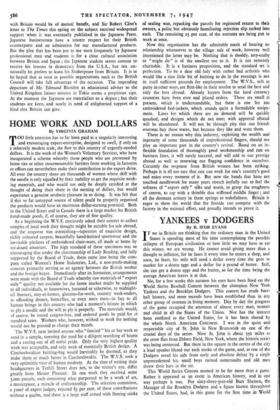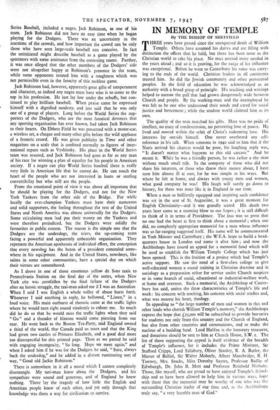YANKEES v DODGERS
By B. IFOR EVANS
IF we in Britain are thinking that the ordinary man in the United States is spending most of his time contemplating the possible collapse of European civilisation or how little we may have to eat this winter, we are wrong. He cannot avoid giving more than a thought to inflation, for he faces it every time he enters a shop, and soon, he fears, his wife will need a dollar every time she goes to market for a dozen eggs and a dollar for a pound of butter. Still, she can get a dozen eggs and the butter, so for the time being the average American leaves it at that.
No, for a few weeks this autumn his eyes have been fixed on the World Series Baseball Contest between the champion New York Yankees and the Brooklyn Dodgers. This contest has made base- ball history, and more records have been established than in any other group of contests in living memory. Day by day the progress of the game occupied the attention of almost every man, woman and child in all the States of the Union. Nor has the interest been confined to the United States, for it has been shared by the whole North American Continent. I was in the quiet and respectable city of St. John in New Brunswick on one of the crucial days of the series. Now St. John is about 55o miles as the crow flies from Ebbets Field, New York, where the historic series was being contested. But there in the square in the centre of the city a loud speaker blared out each stroke of the game, and, as one of the Dodgers saved his side from early and absolute defeat by a single unprecedented hit, small boys turned somersaults and old men threw their hats in the air.
This World Series Contest seemed to be far more than a game. Rather it appeared as an event in American history, and in one way perhaps it was. For sixty-three-rear-old Burt Shotten, the Manager of the Brooklyn Dodgers and a figure known throughout the United States, had, in this game for the first time in World Series Baseball, included a negro, Jack Robinson, as one of his team. Jack Robinson did not have an easy time when he began playing for the Dodgers. There was an uncertainty in the reactions of the crowds, and how important the crowd can be only those who have seen large-scale baseball can conceive. In fact the uninitiated might describe baseball as a game played by the spectators with some assistance from the contesting teams. Further, it was once alleged that the other members of the Dodgers' side were not altogether happy at Robinson's presence in the team, while some opponents treated him with a roughness which was not permissible even in the ferocity of this reckless game.
jack Robinson had, however, apparently great gifts of temperament and character, as indeed any negro must have who is to come to the top in his profession. He lust lay low under the rebuffs, but con- tinued to play brilliant baseball. When praise came he expressed himself with a dignified modesty, and just said that he was only one of a group of players. Long before the World Series the sup- porters of the Dodgers, who are the most fanatical devotees that any sporting organisation has ever known, had taken Jack Robinson to their hearts. On Ebbets Field he was presented with a motor-car, a wireless set, a cheque and many other gifts before the wild applause of a frenetic crowd. He was given publicity in Time and other magazines on a scale that is confined normally to figures of inter- national repute such as Vyshinsky. His place in the World Series team was assured, and Jack Robinson had gone as far as any man of his race for winning a plan of equality for his people in American society. If a negro can play World Series baseball there is really very little in American life that he cannot do. He can touch the heart of the people who are not interested in loans or sterling convertibility but who still are the people.
From the emotional point of view it was above all important that he should be playing for the Dodgers, and not for the New York Yankees from the other side of the Bridge. For while locally the ever-champion Yankees must have their numerous and solid supporters, the feeling throughout the rest of the United States and North America was almost universally for the Dodgers. Some ca:culating men had put their money on the Yankees and were therefore prejudiced, but the Dodgers were solidly the favourites in public esteem. The reason is the simple one that the Dodgers are the underdogs, the triers, the up-coming team facing a powerful and apparently unbeatable organisation. They represent the American apotheosis of individual effort, the conception that every newsboy has the baton of a president concealed some- where in his equipment. And in the United States, newsboys, like saints in some other communities, have a special day on which their virtues are remembered.
As I drove in one of those enormous yellow de Soto taxis to Pennsylvania Station on the final day of the series, when New York city was crestfallen by the final failure of the Dodgers after an heroic struggle, the taxi-man asked me if I was an Australian. When I said I was English a whole volley of abuse burst forth. Whenever I said anything in reply, he bellowed, "Listen," in a loud voice. His main outburst of rhetoric came at the traffic lights where he would turn right round virulently to exhort me. So much did he do so that he would miss the traffic lights when they said " Go " and a thunder of klaxons would come piercing from our rear. He went back to the Boston Tea-Party, said England owned a third of the world, that Canada paid us taxes and that the King had given two castles to Princess Elizabeth, and a good deal more too disrespectful for this printed page. Then as we parted he said with engaging incongruity, " So long. Hope we meet again," and when I asked him if he was for the Dodgers he said, " Sure, always back the underdog," and he added in a distant ruminating sort of way, " Good old Jackie Robinson."
There is somewhere in it all a moral which I cannot completely disentangle. My taxi-man knew about the Dodgers, and his sympathies were sound and generous, and of England he knew nothing. There lay the tragedy of how little the English and American people knew of each other, and yet only through that knowledge was there a way for civilisation to survive.



































 Previous page
Previous page